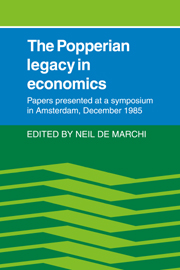Book contents
- Frontmatter
- Contents
- Preface
- List of contributors
- Introduction
- Discussion
- Part I Popper as a philosopher of science
- Part II Popper among the economists
- Part III Falsification and trying to do without it
- Part IV The missing chapter: empirical work and its appraisal
- Part V Non-Popperian perspectives on economics
- 9 The case for pluralism
- 10 Thick and thin methodologies in the history of economic thought
- 11 Economics as discourse
- Index
9 - The case for pluralism
Published online by Cambridge University Press: 05 January 2012
- Frontmatter
- Contents
- Preface
- List of contributors
- Introduction
- Discussion
- Part I Popper as a philosopher of science
- Part II Popper among the economists
- Part III Falsification and trying to do without it
- Part IV The missing chapter: empirical work and its appraisal
- Part V Non-Popperian perspectives on economics
- 9 The case for pluralism
- 10 Thick and thin methodologies in the history of economic thought
- 11 Economics as discourse
- Index
Summary
Introduction, acknowledgments, and dedication
This is a revised version of a paper delivered at the conference, The Popperian Legacy in Economics, held in Amsterdam in December 1985 to honor the retirement of J.J. Klant.
I apologize in advance for writing what is bound to be perceived as a very egocentric chapter. In it I trace the development of some of my ideas on methodology, and I attempt to construct a case for pluralism. In constructing my case, I try to answer some of the objections I have heard most often concerning pluralism. Most of these objections were raised by a number of people who commented on earlier drafts of this chapter. I am indebted to Neil de Marchi, Wade Hands, Uskali Maki, Bob Coats, Roy Weintraub, Dan Hausman, Mark Blaug, Larry Boland, and members of Neil de Marchi's workshop in the history of economic thought at Duke University for their thoughtful comments and criticisms. Finally, I would like to dedicate this chapter to J.J. Klant. I suspect that he will feel some ambivalence about this, since many of the ideas expressed here will not meet with his full approval. However, it should be clear that I share his desire to understand better the “rules of the game” in economics.
- Type
- Chapter
- Information
- The Popperian Legacy in EconomicsPapers Presented at a Symposium in Amsterdam, December 1985, pp. 231 - 244Publisher: Cambridge University PressPrint publication year: 1988
- 12
- Cited by

